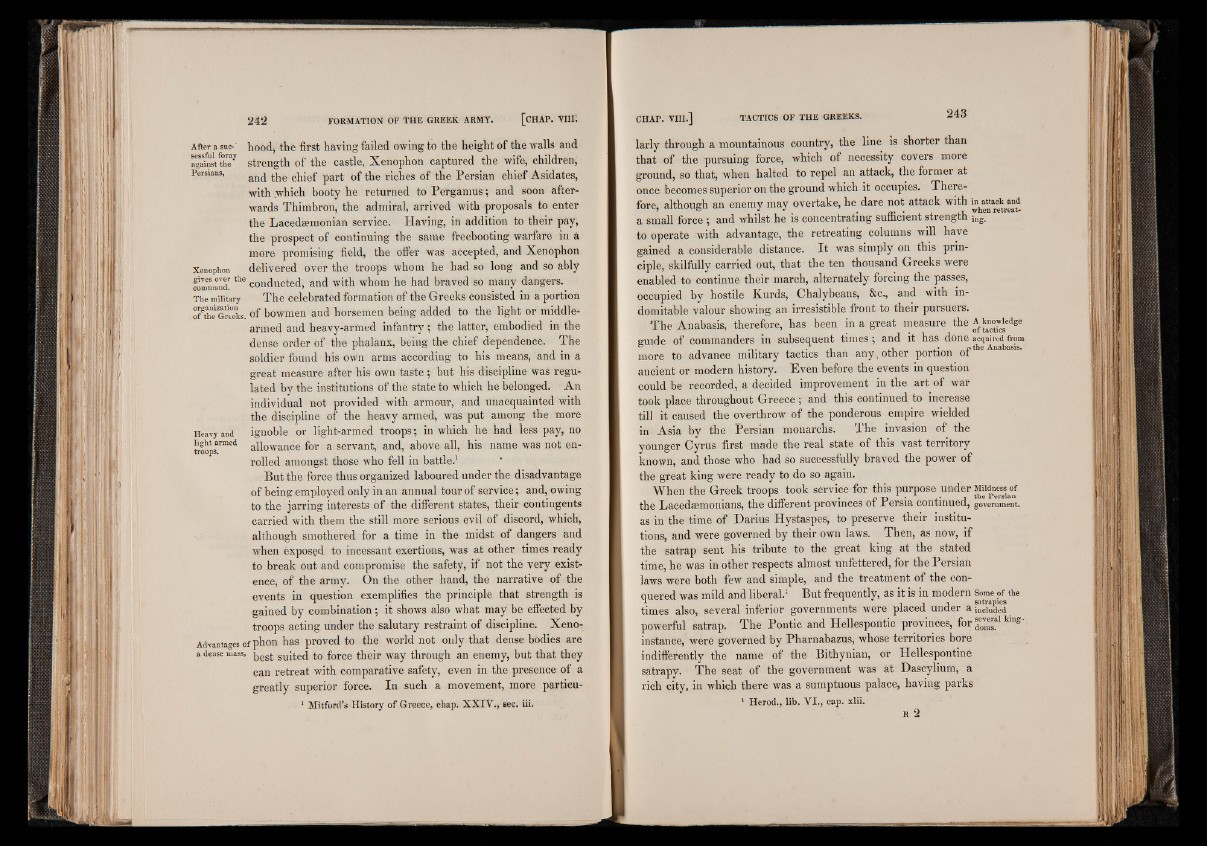
After a sac-' hood, the first having failed owing to the height of the walls and
against the ^ strength of the castle, Xenophon captured the wife, children,
Persians, ^ chief part of the riches of the Persian chief Asidates,
with which booty he returned to Pergamus; and soon afterwards
Thimbron, the admiral, arrived with proposals to enter
the Lacedaemonian service. Having, in addition to their pay;
the prospect of continuing the same freebooting warfare in a
more promising field, the offer was accepted, and Xenophon
Xenophon delivered over the troops whom he had so long and so ably
fommani | | conducted, and with whom he had braved so many dangers.
The military The celebrated formation of the Greeks consisted in a portion
o P a e Greeks, of bowmen and horsemen being added to the light Or middlearmed
and heavy-armed infantry ; the latter, embodied in the
dense order of the phalanx, being the chief dependence. The
soldier found his own arms according to his means, and in a
great measure after his own taste ; but his discipline was regulated
by the institutions of the state to which he belonged. An
individual not provided with armour, and unacquainted with
the discipline of the heavy armed, was put among the more
Heavy and ignoble or light-armed troops; in which he had less pay, no
light armed alfowance for a servant, and, above all, his name was not en- troops*
rolled amongst those who fell in battle.'
But the force thus organized laboured under the disadvantage
of being employed only in an annual tour of service; and, owing
to the jarring interests of the different states, their contingents
carried with them the still more serious evil of discord, which,
although smothered for a time in the midst of dangers and
when exposed to incessant exertions, was at other times ready
to break out and compromise the safety, if not the very existence,
of the army. On the other hand, the narrative of the
events in question exemplifies the principle that strength is
gained by combination; it shows also what may be effected by
troops acting under the salutary restraint of discipline. Xeno-
Advantagesofphon has proved to the world not only that dense bodies are
a dense mass, ^ eg(. sujtecj to force their way through an enemy, but that they
can retreat with comparative safety, even in the presence of a
greatly superior force. In such a movement, more particu-
1 Mitford’s History of Greece, chap. X X IV ., see. iii.
larly through a mountainous country, the line is shorter than
that of the pursuing force, which of necessity covers more
ground, so that, when halted to repel an attack, the former at
once becomes superior on the ground which it occupies. Therefore.
although an enemy may overtake, he dare not attack with in attack and * ® . * /v> • , , ,i wli6Dretreat- a small force ; and whilst he is concentrating sufficient strength i„g.
to operate with advantage, the retreating columns will have
gained a considerable distance. It was simply on this principle,
skilfully carried out, that the ten thousand Greeks were
enabled to continue their march, alternately forcing the passes,
occupied by hostile Kurds, Chalybeans, &c., and with indomitable
valour showing an irresistible front to their pursuers.
The Anabasis, therefore, has been in a great measure the A knojdedge
guide of commanders in subsequent times; and it has done acquired from
° . . . . ,i m nthe Anabasis. more to advance military tactics than any, other portion ot
ancient or modern history. Even before the events in question
could be recorded, a decided improvement in the art of war
took place throughout Greece; and this continued to increase
till it caused the overthrow of the ponderous empire wielded
in Asia by the Persian monarchs. The invasion of the
younger Gyrus first made the real state of this vast territory
known, and those who had so successfully braved the power of
the great king were ready to do so again.
When the Greek troops took service for this purpose under MUdm^sof
the Lacedaemonians, the different provinces of Persia continued, government,
as in the time of Darius Hystaspes, to preserve their institutions,
and were governed by their own laws. Then, as now, if
the satrap sent his tribute to the great king at the stated
time, he was in other respects almost unfettered, for the Persian
laws were both few and simple, and the treatment of the conquered
was mild and liberal.1 But frequently, as it is in modern Some of the
. . i j j satrapies times also, several inferior governments were placed under a included
powerful satrap. The Pontic and Hellespontic provinces, for^™lkm°'
instance, were governed by Pharnabazus, whose territories bore
indifferently the name of the Bithynian, or Hellespontine
satrapy. The seat of the government was at Dascylium, a
rich city, in which there was a sumptuous palace, having parks
f Herod., lib. V I., cap. xlii.
R 2